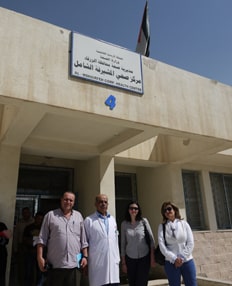According to the World report on disability, jointly produced by the WHO and the World Bank, more than a billion people in the world experience disability. Of this number, the majority currently lack access to appropriate medical care and rehabilitation services, especially those living in low and middle income countries.
The UN Convention on the Rights of Persons with Disabilities states that people with disabilities should be provided with appropriate health services, including general health care and rehabilitation services, and should not be discriminated against in the provision of healthcare.
In response to these needs FPSC, its Jordanian partner Al-Hussein Society and AECID cooperated to create and implement a project called ‘Improvement of the Social Integration of Disabled Persons in the Middle East through accessibility’.
Through undertaking numerous activities, its objectives are to increase and improve accessibility issuesfaced bydisabled peoples in Jordan and the Middle East, and in doing so reduce the challenges they face in attaining and maintaining optimum health, and reducing barriers to full inclusion and participation in all aspects of life.

One specific objective was to adapt a health center in Mshairfeh (Zarqa Governorate), Jordan, to improve the accessibility of the estimated 58,000 to 83,000 people affected by disability in the area (WHO statistics). Serving large portions of the local community, includingJordanians, and Palestinian, Iraqi and Syrian refugees, the project aimed to positively and constructively enhancethe lives of people with disabilities by facilitating improvements in their general health, educational achievements, and ability to prosper economically.
The objective was a resounding success. Medical facilities are spread over a single floor with multiple entrances and exits providing access wherever necessary. Ramps were installed inside and outside the health center building according to accessibility standards. Hand rails were also specifically designed and produced for the toilets, ramps and stairs. And the toilets themselves were adapted to meet accessibility standards.
Through making medical equipment more accessible, patients and doctors also reported reduced levels of vulnerability and better control over the spread of disease. Furthermore, greater access to preventative medical care and care for minor issues meant health problemswere detected and treated before turning into major and possibly life-threatening issues.
The project continues throughout Jordan, improving integration, healthand independency.

